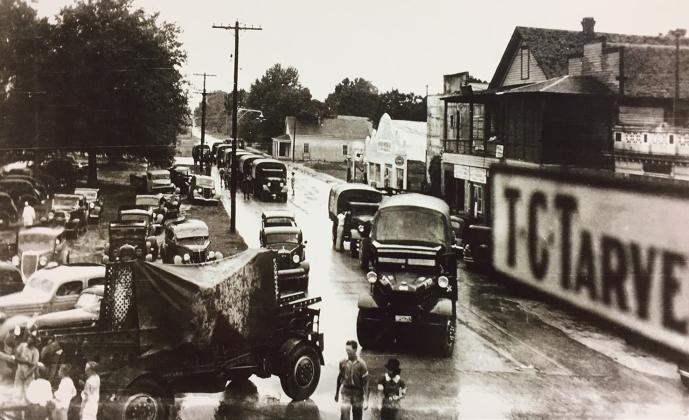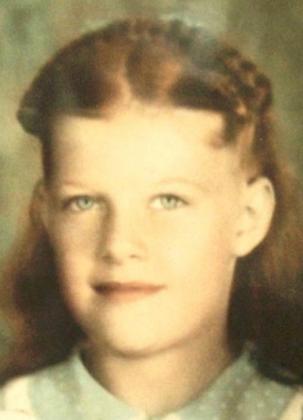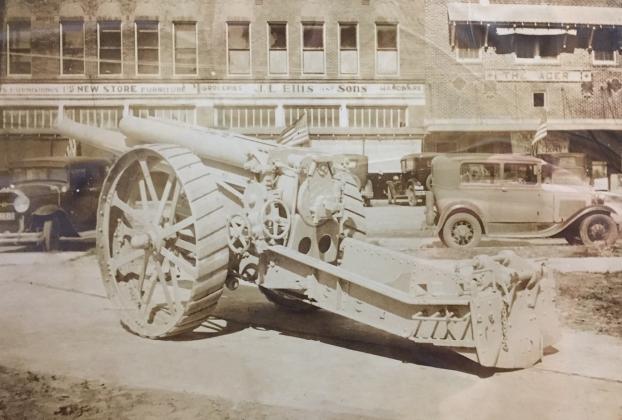Memories of growing up in the days of World War II
Once upon a time, in a small town in Texas named Liberty, population 2,000-plus, families lived in peace with their neighbors, even though a World War was raging on the other side of the world. As children, we were aware of it, through radio, newspapers, and Newsreels at the movies, but it didn’t really effect us in a personal way, unless we had a father or brother who was in the service.
I have many memories of those years, the early ’40s, and of our special little town. We had two downtown movie theaters, owned by the Milentz family, one of which, The American, was on Main Street in the building where Jax restaurant is now located, and the other one, The Park, was on Sam Houston Street, where the Liberty Opry is now. The American showed Type B and Western movies, and the Park had the latest in top movies with all the big stars of Hollywood. Mrs. Milentz had her little ticket booth with a glass window where she sold the tickets for the current movie, and dear little Mr. Milentz stood at the door and collected the tickets as everyone entered. He was always jolly and had something to say to each person, and if it was a sad movie, he often also passed out Kleenex for your tears. Mr. and Mrs. Milentz also owned the theater in Daisetta, and in later years had a drive-in theater on North Main. Remember, during those years, we did not have TV, or computers and the internet, so the movies were a very big part of our entertainment.
Our Grammar School was on Sam Houston Street, where the Post Office is now, and it was a big block-shaped two-story building, with a large playground all around. A small frame building stood on the back corner, and during my years at that school it served as the cafeteria. And we were served real meals, no hot dogs or pizza (I don’t think we even knew what pizza was), but some type of meat and two or three veggies, a real balanced meal.
Oftentimes, there would be War Bond rallies at the Courthouse square, and there would be “Movies Stars” (of the B Variety), and speeches and large crowds, because everyone was very patriotic and wanted to do their bit to help the war effort. Adults would buy War Bonds of various denominations, which would accrue in value so that after a number of years would reach the face value, i.e., if you bought a $25 bond, you paid only $18.75. Children had books to fill with stamps (10 cents each) and at maturity the books were worth the equivalent of a bond. We collected bits of metal, old pots and pans and anything else made of metal to help with the needed metals to help build planes, and ships, and guns. We worked like little beavers to collect as much as possible.
Women gave up their silk and nylon stockings, as they were needed to make parachutes, and since that left them with bare legs (shock!), they would pretend that they still had stockings on by painting a line up the back of their legs to look like seamed hose. Everyone had ration books for the necessary things, like gasoline, tires (very hard to come by), groceries, sugar in particular, shoes, and in our family most of our shoe ration went to keep my sister in shoes because she was a big tomboy and wore hers out very fast.
The city swimming pool was located off of Main Street, near where the city electrical plant was located. It was a beautiful pool, and that was our summertime activity, going swimming as often as we had the little bit of change it took to pay our way in. Back behind the pool, in a little grove of trees, Mr. and Mrs. Van-Deventer had a little snack shop, so after swimming we would take our nickel or dime to buy a treat: a package of peanuts and a drink called Grapette, which came in a little tiny bottle, or maybe a candy bar, which could be had for a nickel and was as big as the $1 size now. There were no private pools at that time, mid no Country Club with a pool, so swimming meant going to the city pool, or to the beach which was difficult due to the travel problems for cars.
The Liberty City Hall was used quite often for birthday parties and other activities, and during high school was the perfect place for dances and proms, and always the celebration dances after the Friday night football games, win or lose, (A lot of my growing up years disappeared when it was torn down a few years ago). The City Hall was rented to be used for parties, dances and many other activities for a very minimal sum, and the jukebox could be included for just a little bit more, usually $5, and came fully loaded with all the popular music of the day.
Most of the town activities took place around the Courthouse: there were three dry goods stores,(the Grand Leader, the Fair Store, and Autry’s store), three drugstores, Griffin’s, across Main from Liberty Drug (originally Steusoffs), and McGinty’s over on Trinity, all with soda fountains serving ice cream and shakes, and sandwiches. There were three grocery stores: the QP, Presswood’s, both on Main across from the courthouse, and Guy Devore’s, also across from the courthouse but on Trinity Street. We had three cafes around the courthouse, two banks, a jewelry store (originally owned by Gus Deblanc, and later owned by his nephew, Audie Creel). Everything you could want was in downtown Liberty, and before there were malls everyone shopped in town, except for an occasional trip to Houston or Beaumont for special things. There was a large cannon parked on the courthouse square (Charles Wiggins can probably verify exactly what type of gun it was), but we called it a cannon, and often posed for photos by it.
One of the things that we now take for granted was air-conditioning, and it existed then, but not in homes. A few businesses, like Price’s Cafe, on the corner where the FLNB hospitality room is now, had it, but that was rare. Homes kept their windows raised for whatever breeze might happen by. Fans were used to keep everyone cool, and many homes had attic fans, which not only pulled in air, but also dust and moisture. Children played outside all the time, and every neighborhood would find a large yard, or empty lot, filled with children playing baseball or any number of games. School began the first Tuesday after Labor Day in September, and ended the middle of May, so there was a lot of time to fill in playing with your friends. Not a lot of families took vacation trips, due to war-time rationing of gasoline, etc., so playing games took up a lot of hours. We played a lot of board games, like Monopoly and Chinese Checker, and listened to the
radio for “The Little Orphan Annie Show” and “Flash Gordon,” and others which we waited anxiously for, like “The Shadow” which always opened with a loudly creaking door. Then, as now, there were soap operas for the ladies to listen to as they cleaned their homes, and in my family, as I’m sure for many others, in the evenings after supper, we all sat around the radio and listened to the latest war news.
I believe that our town was just like so many others during that time, completely patriotic and in sympathy with our neighbors who had family members serving in war zones. The Million family bad a 5-and-dime store on Main Street, with large plate glass windows. and many of the servicemen’s photos were displayed there. There were often times when months and months would go by while families at home longed for news of their loved ones away. Little flags were hung in window and to tell that there was a family member serving, and mostly they were blue, but there were also gold ones, which meant that family had lost someone to the war. The news that President Franklin D. Roosevelt had died was quite a shock, as he had been president for all of my life, and I guess I thought that he would always be. But soon the war was over, on all fronts, and the men began to comeback home! As the men (there were very few
As the men (there were very few women in service at that time) began to return home they needed jobs, so the women who had taken their place in the workforce returned to their homes, to take care of their families, but many women liked working outside the home and earning their own money, so they continued on in various fields of business, or went to college to gain an education. Things never return back to what they were before an interruption of lifestyle, but some of what was not good before went away forever, and some of what was new and different became the new “normal.” And so life in Liberty continued on as usual.



